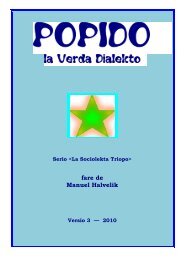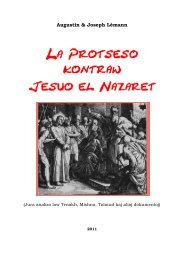the TRIMERAL SYSTEM in BIOLOGICAL TAXONOMY - universala ...
the TRIMERAL SYSTEM in BIOLOGICAL TAXONOMY - universala ...
the TRIMERAL SYSTEM in BIOLOGICAL TAXONOMY - universala ...
You also want an ePaper? Increase the reach of your titles
YUMPU automatically turns print PDFs into web optimized ePapers that Google loves.
1. Reduce complex ethnic spell<strong>in</strong>gs.to a m<strong>in</strong>imum (ideally<br />
no more than four syllables), us<strong>in</strong>g only characters<br />
employed <strong>in</strong> Uniespo and <strong>the</strong> ITK, <strong>in</strong> accordance with<br />
Rule 18. And that goes of course for “Lat<strong>in</strong>” centipedes<br />
too!<br />
Saxegothaea Saksegotio<br />
Bouss<strong>in</strong>gaultia Bus<strong>in</strong>goltio<br />
Parapallaseakotylodermogammarus Kotylodermo<br />
Roberthoffstetteria nationalgeographica Robertusso<br />
2. If non-Lat<strong>in</strong> names are translatable — such as those<br />
lat<strong>in</strong>ized from Russian or Ch<strong>in</strong>ese — it is necessary,<br />
without exception, to turn <strong>the</strong>m <strong>in</strong>to comb<strong>in</strong>ations of<br />
correspond<strong>in</strong>g and <strong>in</strong>ternational ITK-roots.<br />
Krasnopoevaecejathus tyrgaensis REPINA, KHOMENTOVSKII,<br />
ZHURAULEVA & ROZANOV, 1964 Ruberosomfo turguja<br />
3. Provide <strong>the</strong>m with <strong>the</strong> end<strong>in</strong>g -(Z)IO which, though<br />
hav<strong>in</strong>g no mean<strong>in</strong>g <strong>in</strong> itself, does serve as a marker to<br />
denote <strong>the</strong> word <strong>in</strong> question foreign and <strong>the</strong>refore<br />
officially devoid of coherent <strong>in</strong>nate mean<strong>in</strong>g:<br />
Brosmius Brosmio<br />
(German) Pfrille Pfrilio<br />
Fuxsio, Panio, L<strong>in</strong>eio, Lamarkio... a.s.o.<br />
The difference between this rule and Rule 5, is that here we are<br />
deal<strong>in</strong>g with words hav<strong>in</strong>g no (tangible) mean<strong>in</strong>g, as opposed to<br />
those with at least some degree of comprehensibility<br />
4. Where tradition need not be observed — as <strong>in</strong> co<strong>in</strong><strong>in</strong>g a<br />
name for a new genus — but <strong>the</strong> author is determ<strong>in</strong>ed to<br />
use a proper name, it should be borrowed from a<br />
universally exist<strong>in</strong>g concept such as a country, lake,<br />
mounta<strong>in</strong>, city, ethnic group, mythological figure, or <strong>the</strong><br />
17






